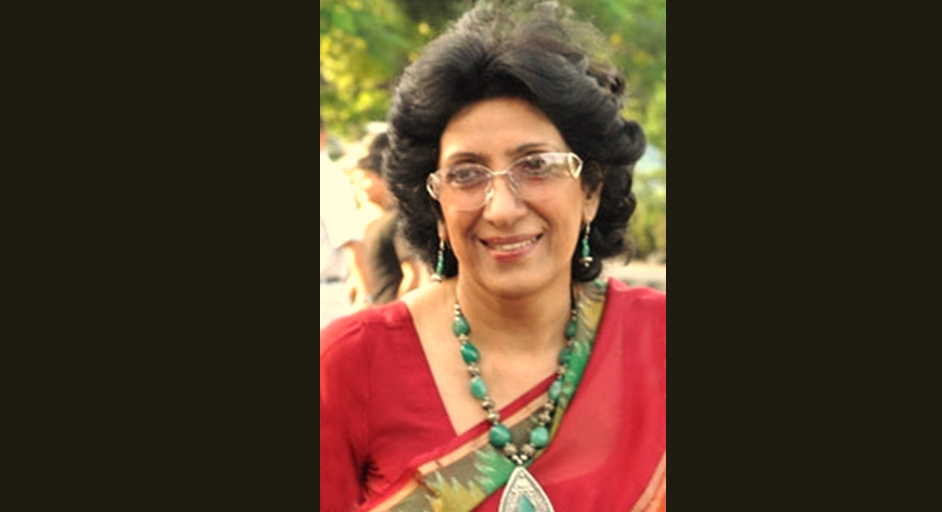- I am fortunate that I have got an opportunity to converse with you. As a Principal/teacher/educationist, your deep experience has enabled you to unite theory and practice as far as school education and pedagogic questions are concerned. How did you begin your journey as an educationist?
Despite my mother having been in education and starting a school 60 years ago, my first love was to teach in a college and to explore doing research, which I started doing in Chinese History after my Masters. After doing a course in Chinese language from Delhi University, followed by a teaching stint at Miranda House for three years, I joined Bluebells. Though I had to discontinue with my research, I have never looked back ever since.
Since then it has been an amazing journey of understanding the pulse and the vibrancy of school education, and the joy and responsibility of working with children.
Redesigning of the curriculum from the narrow confines of scholastic education, to broadening the childrens’ vision and sensitizing them to societal and world issues, is every educators dream. The focus being on character development and the building of an egalitarian and humane society. It is an ongoing journey.
- At this turning point when the pandemic has unsettled everything, what, according to you, are the challenges teachers and educationists have to cope with?
Covid-19 the great disruptor has brought with it, opportunity for realizations, growth and innovation in all spheres including education.
The evolving education scenario is undoubtedly pulsating with Governance challenges, curriculum imperatives & health and security issues. Managing change with empathy and efficiency is the need of the hour.
For educationists, learning technology under such duress, getting accustomed to the new norms of e-teaching, managing their work-life balance, are amongst the many trials and tasks that they face every day.
Included in the above are:
-
-
-
- keeping pace with technology, as teachers need to go through a rigorous and consistent training process to continuously improve their digital proficiency.
-
-
-
- dealing with a curriculum that is not designed for self-learning
-
- re writing plans to deliver the syllabus in virtual classrooms
-
- ensuring learning standards are not compromised
-
- teachers concern about learning gaps
-
- conducting assessments that must be done despite counter assurances from all concerned is not easy to deal with. Yet, it is an opportunity to lift assessments to a new plane, that assess students learning and creative thinking, and dismantle the CBSE’s full marks model of rote learning.
-
- the non-existence of experiential learning for children
-
- classrooms are now on a laptop at home, monitoring students, getting them to adhere to netiquettes is challenging
-
- teachers need to be supported to facilitate quality engagement with children, to ensure every moment is a learning and enriching experience for the students
-
- for the very young not being together with their peers does not give them the opportunity for socialization. Empathy, communication and caring for others are important skills that they learn in a school
-
- in any form of effective communication, a series of attentive responses is required, be it through words or body language. But now when students are dispirited both on the desire to learn and on purpose, the psychological barrier stops this effective communication from taking place
-
- the physical connect with the students that gives the teacher a chance to build that special relationship is lost. The laughter, mirth, fights, conflicts, catching them loitering in the school corridors and playgrounds that drives a teacher and keeps her alive and kicking is missed
-
- many of life’s lessons are learnt only under the roof of a school. which is not merely a concrete building but a hub of interaction with peers and adults
To impact the student’s mind with exciting new experiences, innovative and resourceful techniques is important in this new ethos of education. However, a whole school approach -that supports both teacher and student health and well-being needs serious consideration.
- These days ‘online teaching’ is becoming the new normal. We are aware of the digital divide in the country. Apart from this heightened inequality, do you feel that there are other pedagogic problems implicit in ‘online education’?
Remote learning limits human interactions to a virtual platform and this can be robotic and objective, hampering the opportunity for physical and emotional expression – the warmth, love and pats on the back that happen in a physical classroom as acknowledgement of a child’s being, are missing.
Along with this online education poses certain pedagogic challenges because:
-
-
-
-
-
-
-
-
-
-
- Socialization and learning life skills requires face to face events and interactions
-
-
-
-
-
-
-
-
-
-
- Learners are not necessarily self-motivated and self-regulated
-
- Individuals have preferential learning styles.
-
- All learners are not comfortable with virtual learning
-
- All learners do not necessarily learn at the same pace
-
- The joy of experiential learning in labs and classrooms has had to be replaced by computer simulations
-
- All educators are not equipped to conduct virtual classes – the lack of expertise of teachers in digital pedagogy is a major impediment to student’s continuous engagement
-
- Online evaluation and assessment of learning needs to be reinvented with creativity that assess deeper understanding v/s rote learning
-
- Evaluating the learning of children with special needs require new tools and techniques
-
- Reaching out to a substantial number of EWS students at school needs consideration, as they are unable to have access to devices needed for online learning. However, with our limited resources, we have been able to support a sizeable number of them with laptops and tablets to ensure that they do not discontinue with their classes. Of course, it is a major challenge and we need the government’s support in working out alternate strategies
- Education is not merely about the dissemination of textual knowledge, covering the syllabus, or conducting the examinations. Education is also a relationship, a communion. Do you feel that quite often we have failed to communicate with children, understand their fear, anxiety and mental agony at this time of the pandemic, and instead, burdened them with only assignments and projects?
Yes, often. Maybe not with intent but simply to meet academic planning goals and targets that were set for offline classes. Our education system has always been and continues to be largely fast paced and achievement oriented. Noticeably, parents/educators/the school systems have never given adequate importance to wholesome resilience- building and coping skills. Instead emotional intelligence of the learner has always taken a back seat in the milieu of school education and curriculum academics.
The Covid 19 has given the family, school, and society, an opportunity, and the time to communicate with children, understand their fears and strengthen bonds that nurture relationships and nourish feelings. It is important that their anxieties and trepidations are validated and acknowledged. During this sudden transition from a personal to an impersonal set up the value of building a robust emotional spirit cannot be undermined.
Amidst a situation that shows little hope of relenting soon, we are reviewing the curriculum astutely and working on being ingenious enough to deliver classroom instructions and assignments that keep the needs of the vulnerable learner in mind. Reducing screen time is our priority.
Judicious use of break out rooms on Zoom, for collaborative learning have helped children to construct new knowledge based on the group’s collective past schemas. In the absence of physical activity for children in these times yoga, dance, art, and music classes in their everyday online school routine has provided the much-needed chance to unleash their bottled energies.
To the credit of the mental health department at school, life skill classes are conducted regularly every week to interact with students not only listen to them but encourage them to speak and express freely about their anxieties and fears.
- Bluebells International is a leading progressive school. My experience is that it has always sought to arouse the values of justice, egalitarianism and responsible citizenship among its students. Today the pandemic has revealed—rather sharply—the cleavages within Indian society. The heartless cities, the agony of migrant workers, the insulation of gated communities, the stigma associated with the disease, and the indifference to the pain of others (‘social distancing’ has further intensified it): this is what young learners are observing and experiencing. What, do you feel, should be the role of a school like Bluebells to sensitize its students at this time of bewilderment?
In these turbulent times, it is imperative for parents/schools and students to identify ways and means to put into action the values of caring, sharing, egalitarianism, justice, and responsible citizenship.
These times have offered pragmatic teachable moments…we either use them or lose them, but we are glad to share that the school and students have come forward as always to take care of the community. Sharing, donating, and reaching out to those they found to be the most needy. Small stories they may seem, but efforts made by the counselling and mental health department at school have:
-
- encouraged children to take the initiative from their homes, to personally thank front line workers/helpers/garbage collectors and vendors with gift bags of vegetables and thank you cards
-
- the Student Council have collaborated with Helpage India to engage with the elderly with their cultural performances
-
- parents have reached out and donated masks for distribution to the community
-
- teachers and students have donated sanitisers for the residents of Zamrudpur
-
- conversation with students regarding dignity of labour and their role at home – taking turns in doing all household chores.
-
- students and teachers have been feeding hungry animals in their vicinity.
-
- spending more time with family members and the elderly in the family.
-
- elicited students’ attention to how nature has rejuvenated itself in a clean and healthy environment.
-
- closer to home under the guidance of the student council children and their families along with the teachers have been creatively engaged, sharing their passion for both the performance and visual arts, and keeping everyone’s spirits high.
-
- paying salaries to helpers during the lockdown
Once school reopens after the summer break, the students of the senior classes will be volunteering to teach children from the marginalised section of society at school. They also plan to start crowd funding to raise funds to buy and give data cards to EWS students so that they too can afford to attend the online classes.
The pandemic has given us enough insight to realise that well-being of the community is the well-being of mankind. We pledge to instil amongst our cildren graciousness to be more than an act of kindness. It is important that we learn to move away from me mine and myself mode, to thinking of others and help them grow with compassion and care for the community and the world.
- A school is a place of socialization: theatre and cultural activities, assemblies and sports, and the vibrancy of young souls interacting with one another. Once a school like Bluebells reopens, what kind of challenges are likely to come? Do you think that schools can regain their old spirit? Or because of fear, masks, sanitises and psychology of doubt, schools would lose their charm, and children would be subject to more and more surveillance?
Schools are self-repairing systems; our ecology cannot die. The medium of meeting may change but the charm of being together will always remain. There are bound to be some changes, but it is these changes that drive us forward- leading to evolution, evolution of the body, mind, and spirit.
Let us not underestimate the power of the human spirit to revive and joyfully accept self-sustaining ways to explore life with its ups and downs. The lockdown can be a time for great renovation and rebuilding of faith, gratitude, and respect for environment. Schools need not’ regain their old spirit’ but evolve to a new spirit of ikigai(purpose) and wabi-sabi (beauty of imperfection and impermanence).
The new situation after reopening of the school will require caution from us with respect to safeguarding health, hygiene, and physical distancing. Holding back children from the sheer joy of meeting each other after such a long gap, refraining them from their tete a tete at their favourite meeting points and the playfield will require support from parents and regular counselling by the school.
Children bounce back very fast when adults find creative and innovative ways to engage them. And we are confident that we will be able to work towards a school environment that makes them feel emotionally secure and physically safe, by providing them with their familiar routines.
Ultimately the dream of an expansive vision of education to be without walls and classrooms, borders and boundaries is being realized in this new world. Learning from anywhere, any place could be the exciting new norm.
We are entering another era of new discoveries and are confident that schools will devise creative ways of working towards fostering a balance of the head and heart.









